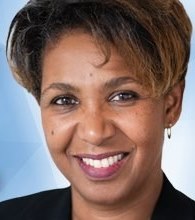OCDSB Appoints New Director of Education – Camille Williams-Taylor
October 2, 2018
The Board of Trustees has appointed Camille Williams-Taylor as the next Director of Education for the Ottawa-Carleton District School Board. Ms. Williams-Taylor will officially assume the role in the New Year.
“We are very pleased to welcome Camille Williams-Taylor to the Ottawa-Carleton District School Board,” said Shirley Seward, Board Chair. “Camille is a recognized leader in public education in Ontario, known for her creative and innovative leadership and her capacity to lead change. We are confident that our district will benefit from her extensive knowledge and commitment to equity, inclusion and human rights. Camille is passionate about bringing voice to students, staff and families to foster positive relationships and support student success.”
Camille Williams-Taylor has over 29 years of experience in education including provincial, post-secondary and public education leadership roles, and has most recently been a senior executive with the Durham District School Board since 2011.
“The Board of Trustees undertook a comprehensive search for a new Director and was fortunate to have several exceptional candidates. We felt confident that Camille has the skills and experience to support our commitment to learning, equity, well-being and engagement” said Seward.
“I am honoured to be joining the Ottawa-Carleton District School Board and would like to thank the Board of Trustees for this opportunity,” said Camille Williams-Taylor. “I am excited about the work this district has done and look forward to the opportunity to build relationships with staff, students, families, and community partners. Working together, we can build a vision for public education that ensures our students have the best learning opportunities in a safe and caring environment”.
“On behalf of the Board of Trustees, I want to thank current Director of Education, Dr. Jennifer Adams, who has provided incredible leadership to the district for the past 8 years. This district is well positioned for the future as a result of Jennifer’s commitment to student learning and strong instructional practice. We are so fortunate that Camille will have an opportunity to do some transition planning with Jennifer in the month of December before officially assuming the role of Director on January 1, 2019.” said Seward.
The Ottawa-Carleton District School Board is a dynamic, creative learning organization that fosters the achievement, well-being and dignity of every student. The largest school district in Eastern Ontario, the OCDSB offers a wide range of programs to 73,000 students in 143 schools. With an annual operating budget of almost $1B, the OCDSB employs approximately 10,000 teaching, administrative, para-professional and custodial staff. Working together, our employees do an exceptional job of supporting student learning and well-being. Please visit the Board website and follow us on Twitter.


